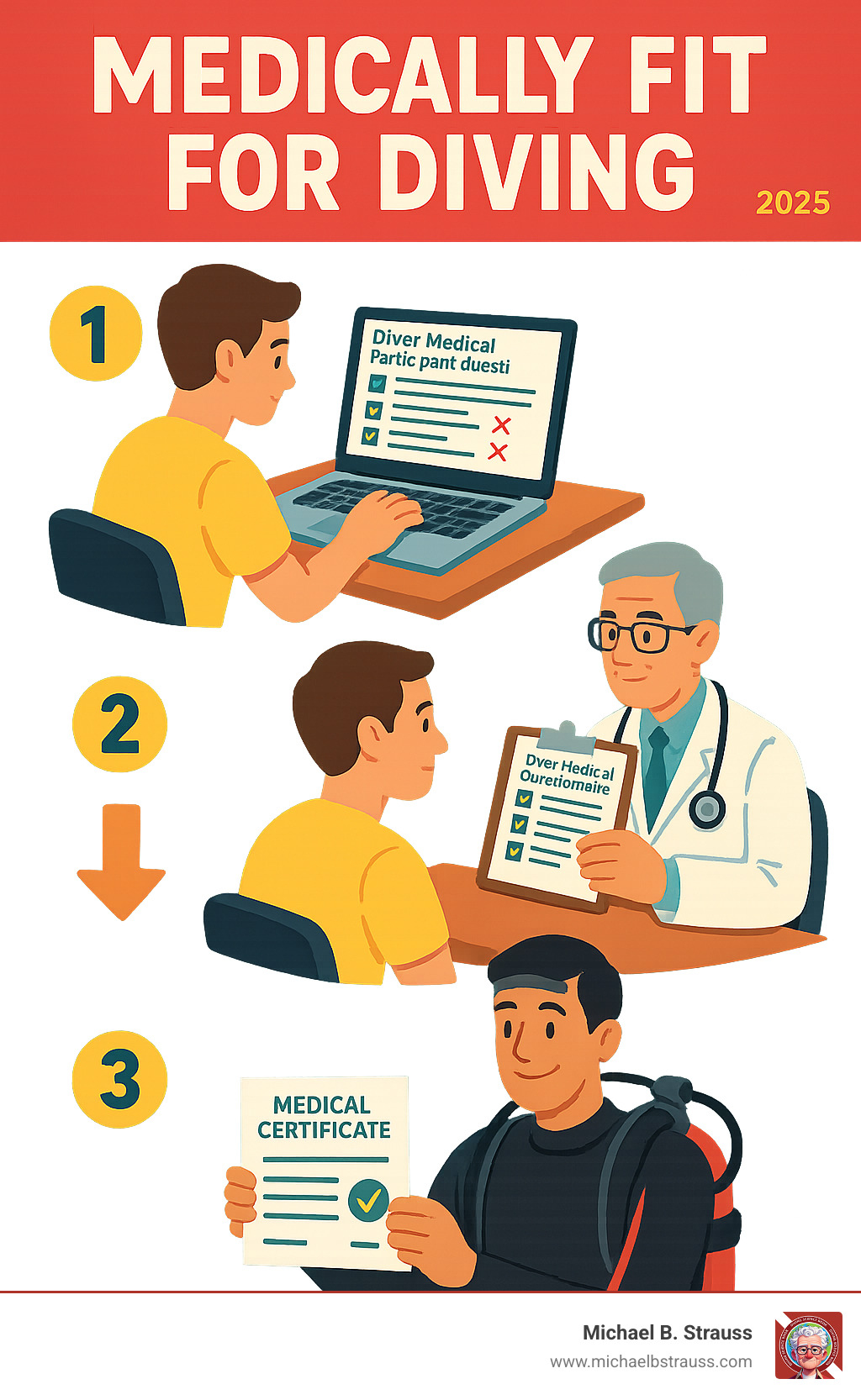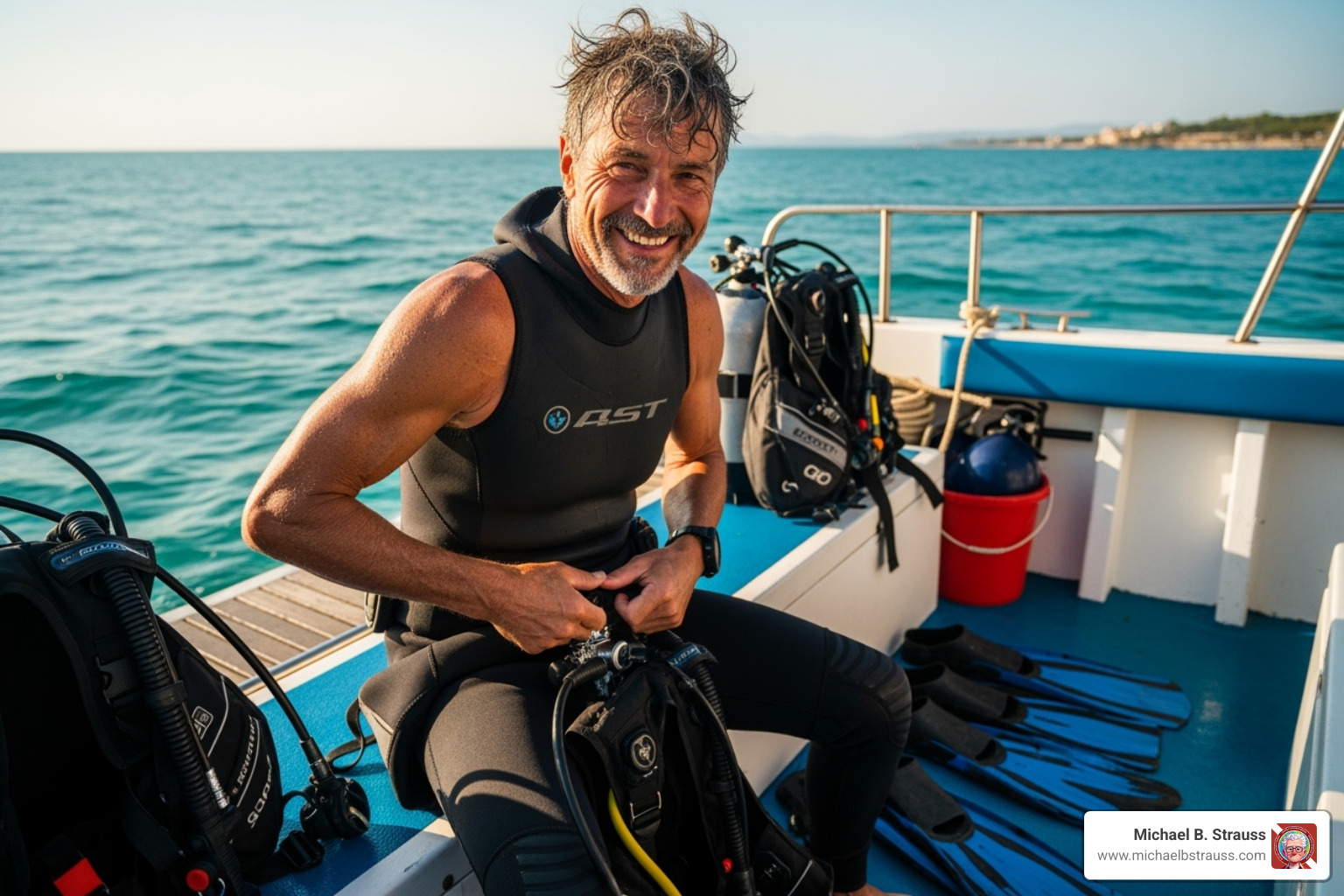Why Medical Fitness Assessment is Critical for Safe Diving
Being medically fit for diving is essential because scuba diving places unique physiological stresses on your body that can turn minor health issues into life-threatening emergencies underwater. Almost 30% of recreational diving fatalities involve cardiac events, making proper medical screening a crucial safety step.
Quick Assessment Guide:
- Complete the Diver Medical Participant Questionnaire
- See a physician if you answer "Yes" to any screening questions
- Get medical clearance before entering the water
- Re-evaluate your fitness regularly and after any health changes
The international Diver Medical Screen Committee (DMSC) developed a comprehensive screening system used worldwide by training agencies like PADI, SSI, and other WRSTC members. This system identifies conditions that could compromise your safety underwater - from heart problems that might cause loss of consciousness to ear issues that prevent pressure equalization.
Unlike surface activities, diving doesn't allow you to simply "stop and rest" if something goes wrong. You're in an environment where your body must handle increased pressure, potential nitrogen absorption, and the physical demands of moving through water while carrying equipment that can weigh up to 40 pounds.
The stakes are real: Conditions like uncontrolled asthma, certain heart diseases, seizure disorders, and even pregnancy can create dangerous situations underwater. But many conditions that seem problematic - like well-controlled diabetes or mild asthma - may be compatible with diving when properly evaluated and managed.

Medically fit for diving terms to know:
Your Comprehensive Guide to Being Medically Fit for Diving
Scuba diving places unique demands on your body. You're carrying up to 40 pounds of gear, swimming against currents, and managing your breathing in an alien environment. The biggest challenge is pressure. As you descend, the increasing water pressure compresses the air spaces in your body—lungs, ears, and sinuses. This is Boyle's Law in action: as pressure increases, gas volume decreases.
If you can't equalize this pressure, especially in your ears, the 'squeeze' can be painful and cause injury. In fact, eustachian insufficiency (the inability to clear your ears) is a common reason for distress. A simple stuffy nose on land can prevent equalization and lead to serious barotrauma underwater. Unlike surface activities, you can't just stop and rest; emergencies require immediate, clear-headed action.
Recognizing this, the international Diver Medical Screen Committee (DMSC) developed a comprehensive screening system used by major training agencies in the World Recreational Scuba Training Council (WRSTC). This system identifies potential problems before they become underwater emergencies, balancing thoroughness with practicality to allow as many people as possible to dive safely.
For those interested in the science behind these physiological changes, you can explore more at Diving Science.
The Diver Medical Screening System: Forms and Guidance
The core of the medical fitness process is a three-part system.
The Diver Medical Participant Questionnaire is your first step. Available in 26 languages, this form requires honest self-assessment of your health history. Answering "Yes" to any question doesn't automatically disqualify you, but it does signal the need for a physician's evaluation to ensure you can dive safely.

If a medical evaluation is needed, your doctor will use the Diver Medical Physician's Evaluation Form. This specialized form guides the physician in assessing how specific conditions might affect your safety in the unique underwater environment.
The third component is the Diving Medical Guidance document, a reference for physicians. It provides detailed information on how various medical conditions relate to diving, ensuring evaluations are consistent and based on current diving medicine. Your family doctor is a good choice for the evaluation, but ensure they consult this guidance. If needed, they can refer you to a diving medicine specialist. This standardized system, adopted by WRSTC members, ensures consistent safety standards worldwide.
You can access all forms and guidance documents from the Undersea & Hyperbaric Medical Society: Download the official Diver Medical forms and guidance documents.
Key Medical Conditions and Being Medically Fit for Diving
Some medical conditions require special attention before diving. While some pose an absolute risk, many can be managed with proper medical guidance.
Absolute Contraindications: These conditions present unmanageable risks underwater.
- Risk of Loss of Consciousness: Uncontrolled epilepsy, certain seizure disorders, or unexplained fainting spells are disqualifying.
- Spontaneous Pneumothorax: A history of a collapsed lung without injury is an absolute bar to diving due to the high risk of recurrence under pressure.
- Severe Heart Conditions: Unstable angina or uncontrolled arrhythmias are extremely dangerous, as cardiac events account for nearly 30% of diving fatalities.
Conditions Requiring Evaluation:
- Asthma: Once a disqualifier, those with mild, well-controlled asthma may dive safely with medical approval. The key is stable lung function without air trapping. Severe or exercise-induced asthma remains high-risk. For details, see this Scientific research on diving with asthma.
- Heart Disease: A history of heart disease isn't an automatic 'no.' If you've had successful treatment and can handle moderate exercise (about 6 METs, like brisk walking uphill), diving may be possible after a thorough cardiac evaluation.
- Ear and Sinus Issues: You must be able to equalize pressure. A perforated eardrum, active infection, or recent sinus surgery are barriers to diving until resolved.
- Diabetes: Many diabetics dive safely with proper blood sugar control and no significant complications. The primary concern is avoiding hypoglycemia underwater.
- Pregnancy: Diving is contraindicated during pregnancy due to unknown effects of pressure and nitrogen on a developing fetus.
- Psychological Fitness: Diving requires calm decision-making. While well-managed anxiety or depression may be acceptable, active panic disorders or severe phobias are dangerous in an environment you cannot easily leave.
Never self-diagnose. Consult a physician to see if a condition can be safely managed for diving.
How Age, Medications, and General Health Affect Fitness
Age, medications, and lifestyle all factor into your fitness for diving.

- Age-Related Screening: As cardiovascular risks increase with age, more frequent medical exams are recommended: every 5 years for divers under 40, every 3 years for those 40-60, and every 2 years for divers over 60. Divers over 45 with risk factors (smoking, high cholesterol, etc.) may need more thorough cardiac testing.
- Exercise Tolerance: You should be able to sustain moderate exercise at about 6 METs—equivalent to carrying groceries upstairs or walking briskly uphill. This ensures you can handle the physical demands of diving.
- Medications: Discuss all prescription, over-the-counter, and psychotropic medications with a diving doctor. The effects of drugs can change under pressure. For example, some decongestants may cause drowsiness at depth. The focus is on whether your underlying condition is stable and if the medication has side effects that could impair you underwater.
- General Health: Lifestyle choices matter. Being significantly overweight can increase decompression sickness risk, while smoking impairs lung function. Good nutrition and rest are crucial for optimal physical and mental performance.
For more information on how pain-related issues can affect diving, see our resource on evaluation and management of pain-related medical problems of diving.
Essential Safety Practices: DCS, Flying, and Lifestyle
Medical clearance is just the start. Safe diving habits are essential.
- Decompression Sickness (DCS): Often called 'the bends,' DCS occurs when nitrogen absorbed under pressure forms bubbles in your tissues during ascent. To prevent it, always follow your dive computer or tables, ascend slowly, and perform safety stops.
- Flying After Diving: Your body releases nitrogen for hours after a dive. Flying too soon can trigger DCS because aircraft cabins are pressurized to a lower ambient pressure (around 8,000 feet). Wait at least 18 hours after multiple dives before flying.
- Hydration: Dehydration reduces blood flow and can increase DCS risk. Drink plenty of water throughout your dive trip.
- Alcohol: Avoid alcohol before diving. It causes dehydration, impairs judgment, and affects coordination.
- Rest and Health: Fatigue clouds judgment. Get adequate rest and never dive when you're sick, especially with congestion that prevents equalization.
- Mental Preparation: Approach each dive with focus. Check your gear, review the plan, and be disciplined enough to cancel a dive if you or the conditions aren't right.
For a deeper understanding of nitrogen management, explore our guide to Decompression Science.
Finding Expert Help and Professional Resources
You don't have to steer diving medical questions alone. A network of expert resources is available.
- Diving Medicine Physicians: These specialists have expertise in both general medicine and the unique physiological stresses of diving.
- Divers Alert Network (DAN): An essential resource for divers. DAN provides a non-emergency medical information line, a physician referral network, and a 24/7 emergency hotline for diving accidents.
- Undersea & Hyperbaric Medical Society (UHMS): This organization develops the medical standards for diving, including the Diver Medical Screening System. Their website is a source for the latest research and guidance.
- Specialized Facilities: Centers like DDRC Healthcare offer guidance for diving with complex conditions like diabetes or cancer.
- UK Approved Medical Examiners of Divers (AMEDs): These specialists offer the highest level of diving medical expertise in the UK.
- Hyperbaric Treatment Centers: Know the location of the nearest recompression chamber, which provides the specialized care needed for serious diving injuries like DCS.
- Dive Insurance: Standard travel insurance often excludes diving. Specialized dive insurance covers evacuation, recompression therapy, and other critical costs. It's a small investment for significant protection.
Access resources and insurance options through Find diving medical resources and insurance through DAN. Seeking expert help is the mark of a responsible diver.
Conclusion: Your Next Steps to Safe Diving
Being medically fit for diving is a personal commitment to your safety. It requires an honest assessment of your health, an understanding of the unique stresses diving places on your body, and a proactive approach to managing any potential risks.
The goal of medical screening isn't to prevent people from diving, but to ensure every underwater experience is as safe and enjoyable as possible. Think of medical fitness not as a one-time checkbox, but as an ongoing journey. Your body changes, and medical science evolves, so regular check-ups are vital, especially as you get older or if your health status changes.
By using trusted resources like DAN, UHMS, and diving medicine specialists, you empower yourself to make smart, responsible choices. This allows you to safely enjoy the incredible underwater world for years to come.
To dive deeper into how your body functions underwater, Dr. Michael B. Strauss's book, "Diving Science Revisited," offers invaluable expert insights for both new and experienced divers. Get your copy today!
DISCLAIMER: Articles are for "EDUCATIONAL PURPOSES ONLY", not to be considered advice or recommendations.






